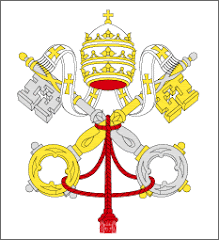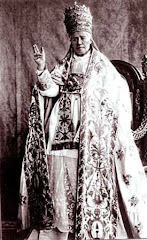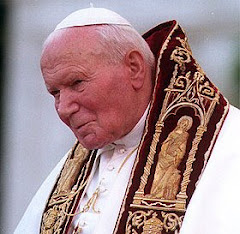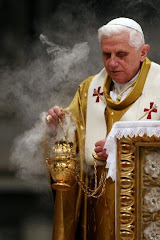 Protestant Objection #3
Protestant Objection #3Not only does Baptism not save, it accomplishes nothing in the soul of the one baptized. It is purely a symbolic action. It is only the external expression of a spiritual reality that has already been accomplished.
Catholic Answer #1:Again, the point must be emphasized that it is simply inexplicable why Jesus, Peter, and Paul would waste time, breath, ink, paper, etc. on such an unnecessary trapping. Moreover, wasting time on materially symbolic rituals is one of the greatest objections that most Protestants have with Catholicism.
As a Catholic, if I was approached by a Protestant inquiring about whether or not I’ve been reborn, my answer would be, “Yes. I’ve been reborn through the waters of Baptism.” To which he would respond, “That’s unbiblical.” The Catholic position on Baptism is that through Baptism we are reborn, made new creatures in Christ, clothed with Christ, and our sins are washed away, literally. In short, we are saved. How can this be reconciled with Scripture one might ask. Not only can it be reconciled with Scripture, it is explicitly taught in Scripture:
John 1:32-34: “(32)And John bore witness, ‘I saw the Spirit descend as a dove from heaven, and it remained on him. (33) I myself did not know him; but he who sent me to baptize with water said to me, ‘He on whom you see the Spirit descend and remain, this is he who baptizes with the Holy Spirit.’ (34)And I have seen and have borne witness that this is the Son of God.’”
Matthew 3:16-17: “(16)And when Jesus was baptized, he went up immediately from the water, and behold, the heavens were opened and he saw the Spirit of God descending like a dove, and alighting on him; (17)and lo, a voice from heaven, saying, ‘This is my beloved Son, with whom I am well pleased.’”
How does one read these verses and continue to hold to the belief that Baptism does nothing? In fact, if, as Protestants say, we must be obedient to the example of Christ, then why would Christ’s example not give the same return to us? To put it another way, the example of Christ indicates that upon Baptism the Holy Spirit comes upon us, Heaven is opened to us(we are saved), and the Father acknowledges us as His sons(and daughters, to be p.c.). Jesus was not baptized to save His own soul, for it did not need saving, but the waters of Baptism must be sanctified in order for it to take effect. His baptism accomplished this and showed us what Baptism does for us.
Answer #2John 2: 6-10: “(6) Now six stone jars were standing there, for the Jewish rites of purification, each holding twenty or thirty gallons. (7)Jesus said to them, ‘Fill the jars with water.’ And they filled them up to the brim. (8) He said to them, ‘Now draw some out, and take it to the steward of the feast.’ So they took it. (9) When the steward of the feast tasted the water now become wine, and did not know where it came from (though the servants who had drawn the water knew), the steward of the feast called the bridegroom (10)and said to him, ‘Every man serves the good wine first; and when men have drunk freely, then the poor wine; but you have kept the good wine until now.’”
The fact that these jars were used for the Jewish rites of purification is an extremely valuable point that must not be overlooked. In the Greek Septuagint, that is, the Greek version of the Old Testament, these waters used for purification were called ‘baptismoi’, from which we get the English word ‘baptism’ (cf. Numbers 19: 9, 13, 18-19). These waters were used to purify oneself, to wash oneself clean of all impurity. Why would the Christians borrow the word ‘baptism’ from the Jewish purification waters if they didn’t already believe that baptism truly did purify one from sin? There must necessarily be a connection between the Jewish waters of purification and the waters of baptism. Otherwise, it would be inexplicable why the Christians would adopt the word ‘baptism’ for that ritual.
Let’s look at the rest of the passage. John makes the point that there were six stone jars. If the number six was insignificant, then John would have left out that needless detail. So it must be admitted that because of its inspiration by the Holy Spirit, it must be significant. The significance is this: the number six is often used to symbolize imperfection. Wine, when taken symbolically, was used to denote perfection (cf. Joel 3:18). When Jesus changes water into wine that is being held by the six stone jars, He is teaching us that He has changed the imperfect waters of the Jewish purification rites into the perfect waters of Baptism, waters that wash not only the exterior, but also the interior. This is in accordance with what St. Peter tells us in Acts 22:16: “And now why do you wait? Rise and be baptized, and wash away your sins, calling on his name.” Notice the connection between washing in the waters of baptism and the washing away of sin. God gave us the imperfect waters in the beginning, that is, in the Old Testament (the waters of the ritual purification). He gave us the perfect waters later, under the New Covenant (the waters of Baptism). Consider what the steward of the feast said to the bridegroom (keep in mind that Jesus is the true bridegroom): “Every man serves the good wine first; and when men have drunk freely, then the poor wine; but you have kept the good wine until now.” One can also see that Jesus pours the perfect and saving waters of Baptism into His imperfect servants.
Notice from the above Scripture citations, both John 1 and John 2 deal explicitly with Baptism, but it doesn’t stop there. John 3 takes it even further.
John 3: 3-6: “(3)Jesus answered him, ‘Truly, truly, I say to you, unless one is born anew, he cannot see the kingdom of God.’ (4) Nicodemus said to him, ‘How can a man be born when he is old? Can he enter a second time into his mother’s womb and be born?’ (5) Jesus answered, ‘Truly, truly, I say to you, unless one is born of water and the Spirit, he cannot enter the kingdom of God. (6) That which is born of the flesh is flesh, and that which is born of the Spirit is spirit.”
Here we see no explicit use of the word ‘baptism’, but the context indicates a clear reference to it. John 1, John 2, and John 3:22 all make explicit references to Baptism and John 3:3-6 is stuck right in the middle of all of this. It would be unreasonable to interpret Jesus’ words any other way. When He says that the way one is “born anew” or “born again” is through water and Spirit, this is clearly a reference to Baptism. Through Baptism, we are born again, that is, we are made new creatures in Christ.
Paul makes explicit his understanding on the effects of Baptism:
Romans 6:3,4: “(3)Do you not know that all of us who have been baptized into Christ Jesus were
baptized into his death? (4)We were buried therefore with him by baptism into death, so that as Christ was raised from the dead by the glory of the Father, we too might walk in newness of life (emphasis mine).”
The plain face of the text indicates that baptism indeed does something for us. We are united to Christ in His death through baptism so that we might rise to newness of life with Him. If baptism unites us to Christ, then logically it must be asserted that baptism is responsible for incorporating us into the Body of Christ. It was Christ’s Body that died and Christ’s Body that was raised. How can we be immersed (for that is what baptism means) in His death and raised with Him if we are NOT a part of His mystical Body? Obviously, being immersed in His death and raised with Him must necessarily refer to our being united to His Body, and as St. Paul teaches, it is baptism that is responsible for this.
Romans 6: 6-8: “(6)We know that our old self was crucified with him so that the sinful body might be destroyed, and we might no longer be enslaved to sin. (7)For he who has died is freed from sin. (8)But if we have died with Christ, we believe that we shall also live with him.”
This passage is in reference to baptism as it immediately follows the passage quoted above, that is, verses 3 and 4 of the same chapter. Verse 3 of chapter 6 teaches that we are baptized (immersed) into His death. What is the nature of this immersion into His death? Paul explains in verse 6 that our old self is crucified with Him. Through this immersion into His death we are freed from slavery to sin, for our sin is crucified with Him. Thus the Catholic teaching that original sin and all personal sins are washed away through baptism.
To build a little more on the concept of being incorporated into the Body of Christ through baptism, it is necessary to quote from Paul’s first letter to the Corinthians.
1 Corinthians 12:12-13: “(12)For just as the body is one and has many members, and all the members of the body, though many, are one body, so it is with Christ. (13) For by one Spirit we were all baptized into one body – Jews or Greeks, slaves or free – and all were made to drink of one Spirit.”
Paul begins by describing the nature of the relationship between the members of the Body of Christ. Though we are many, we are one is His Body. But how did this unity come about? How is it that all of us have come to unity in His Body? Paul’s answer: “We were all baptized into one body.” This unity that is brought about by baptism lays to rest all artificial separation of men, and being baptized into His Body allows us to drink of the Spirit! Beautiful!
In speaking to the Galatians, Paul teaches that in Baptism, the Christian assumes the identity of Christ, we belong to Him, and we become heirs according to the promise.
Galatians 3:27-29: “(27)For as many of you as were baptized into Christ have put on Christ. (28) There is neither Jew nor Greek, there is neither slave nor free, there is neither male nor female; for you are all one in Christ Jesus. (29) And if you are Christ’s, then you are Abraham’s offspring, heirs according to promise.”
The same idea is present here as in 1 Corinthians 12. The difference here is that Paul reveals a little more about the effects of baptism. He teaches that we have put on Christ. Another translation states that we are “clothed with Christ”. But what does it mean to be clothed with Christ? We must first look at the significance of the symbolism of being clothed. What do clothes do for us? They cover us. They protect us. They even identify us, particularly when one wears a uniform. If I see a man wearing a police uniform, I rightly identify him as a policeman. Our clothes are to some degree an external expression of our identity. For Paul to say that through baptism we are clothed with Christ is profound. This means that through baptism we take on the very identity of Christ Himself. Because part of Christ’s identity is that of being God’s Son, then we, too, become sons of God through Baptism. We become part of God’s immediate family. Because Jesus is a descendent of Abraham, then we, too, become Abraham’s offspring. And all of this is due to baptism!
Paul brings us even deeper into the meaning and effects of baptism in his letter to the Colossians.
Colossians 2: 11-15: “In him also you were circumcised with a circumcision made without hands, by putting off the body of flesh in the circumcision of Christ; (12) and you were buried with him in baptism, in which you were also raised with him through faith in the working of God, who raised him from the dead. (13) And you, who were dead in trespasses and the uncircumcision of your flesh, God made alive together with him, having forgiven us all our trespasses, (14)having canceled the bond which stood against us with its legal demands; this he set aside, nailing it to the cross. (15) He disarmed the principalities and powers and made a public example of them, triumphing over them in him.”
Here again we see Paul teaching that by baptism, we are buried with Him that we might be raised with Him. He then teaches that we who were dead in our trespasses have been made alive with Him and our trespasses have been forgiven. The phrase “dead in trespasses” seems an awful lot like the phrase “enslaved to sin” used in Roman 6:6. In Romans 6, Paul teaches us that by baptism we are freed from sin, so longer enslaved. In the same way, to be made alive again, no longer dead in trespasses, must necessarily be brought about the same way, for Paul is talking about the same thing in both cases. Referring again to Romans 6:6, Paul teaches that through baptism, our old self was crucified, that is, nailed to the cross, in order that our sinful bodies might be destroyed. Paul makes a similar allusion in Colossians 2:14 when he teaches that our trespasses and our obligation to the law due to those trespasses have been nailed to the cross. In other words, our old self was crucified. Again, the similarity in language indicates that Paul is speaking about the same thing in both cases – baptism. Therefore, through baptism we are made alive in Christ, our trespasses are forgiven, and our old selves are nailed to the cross.



































